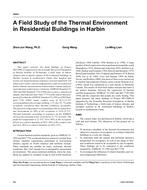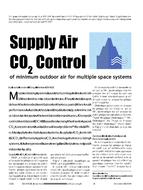Artificial neural nets were used as nonlinear function approximators on two data sets of building energy parameters and solar radiation data. During the modelling (training) phase, the data to be predicted were unavailable, providing a “blind” test of the technique. The first time series consisted of building energy “inputs” (such as solar radiation and temperature) for September-December 1989 and required the prediction of energy use for January-February 1990. The extrapolation was performed with only the data immediately at hand. Although results for chilled- and hot-water use were acceptable, the prediction of electricity use would have benefited markedly from easily available additional information, such as working and nonworking days. The second time series required the prediction of beam solar insolation from four global directional measurements. This was an interpolation problem, and good predictions were achieved for this data set. Conjugate gradient and cascade correlation neural net programs were used.
KEYWORDS: artificial intelligence, expert systems, buildings, heat load, energy consumption, computer programs, accuracy, solar radiation, temperature, calculating, competition
Citation: Symposium, ASHRAE Trans. 1994, Vol.100, Part 2
Product Details
- Published:
- 1994
- File Size:
- 1 file , 680 KB
- Product Code(s):
- D-17682


